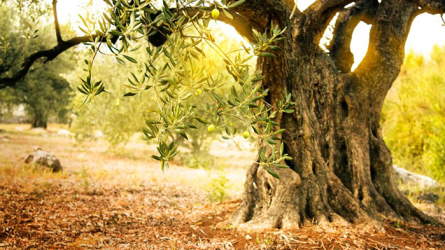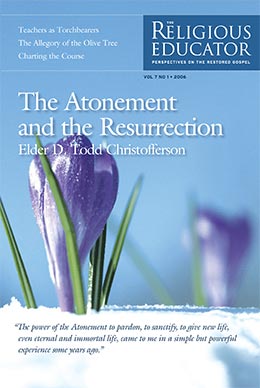Religious Educator Vol. 7 No. 1 · 2006
-
 The true power of the allegory of the olive tree comes from understanding that God is seeking not only for oneness and good fruit but also for servants who become companions, associates, and equals—or "heirs of God, and joint-heirs with Christ" (Romans 8:17).
The true power of the allegory of the olive tree comes from understanding that God is seeking not only for oneness and good fruit but also for servants who become companions, associates, and equals—or "heirs of God, and joint-heirs with Christ" (Romans 8:17). -
 Classroom lessons should be built according to the instructions of the Lord—small, light, and tight—and we should live in a way that the Lord can touch our efforts and fill them with the light of His Spirit.
Classroom lessons should be built according to the instructions of the Lord—small, light, and tight—and we should live in a way that the Lord can touch our efforts and fill them with the light of His Spirit. -
 "God does notice us, and he watches over us. But it is usually through another person that he meets our needs. Therefore, it is vital that we serve each other in the kingdom." —President Spencer W. Kimball
"God does notice us, and he watches over us. But it is usually through another person that he meets our needs. Therefore, it is vital that we serve each other in the kingdom." —President Spencer W. Kimball
Featured Articles
-
 The true power of the allegory of the olive tree comes from understanding that God is seeking not only for oneness and good fruit but also for servants who become companions, associates, and equals—or "heirs of God, and joint-heirs with Christ" (Romans 8:17).
The true power of the allegory of the olive tree comes from understanding that God is seeking not only for oneness and good fruit but also for servants who become companions, associates, and equals—or "heirs of God, and joint-heirs with Christ" (Romans 8:17). -
 Classroom lessons should be built according to the instructions of the Lord—small, light, and tight—and we should live in a way that the Lord can touch our efforts and fill them with the light of His Spirit.
Classroom lessons should be built according to the instructions of the Lord—small, light, and tight—and we should live in a way that the Lord can touch our efforts and fill them with the light of His Spirit. -
 "God does notice us, and he watches over us. But it is usually through another person that he meets our needs. Therefore, it is vital that we serve each other in the kingdom." —President Spencer W. Kimball
"God does notice us, and he watches over us. But it is usually through another person that he meets our needs. Therefore, it is vital that we serve each other in the kingdom." —President Spencer W. Kimball
